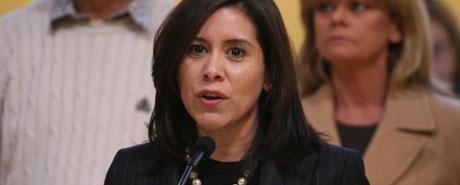Should it be easier to impose new taxes? Or is it a recipe to tax fatigue, given the voting public’s recent support for a water district parcel tax, county sales tax and Prop. 30 for school funding?
California’s legislative Democrats have drafted a raft of constitutional amendments this year, in both the state Senate and Assembly, that propose lowering the voter threshold for tax measures from a supermajority to 55 percent.
City officials at this week’s Rules and Open Government Committee meeting will talk about whether to support the constitutional changes, which include the following:
• SCA 7: Lois Wolk (D-Davis) introduced this Senate constitutional amendment that would allow for a 55-percent vote instead of two-thirds for bonds and special taxes for local libraries. San Jose’s current library parcel tax supplies 20 percent of the city’s library budget and is set to sunset in 2015.
• SCA 9: This measure proposed by Ellen Corbett (D-San Leandro) would lower the threshold to fund community and economic development projects.
• SCA 11: Loni Hancock (D-Berkeley) brought this one forward to help pass new special taxes on local property sales and real estate transactions.
• ACA 3: If passed, this bill by Nora Campos (D-San Jose) would let voters more easily pass taxes to boost public safety funding.
• ACA 8: Bob Blumenfield (D-San Fernando Valley) authored this threshold-lowering proposal, which if passed would let counties, cities and special districts raise property tax and issue bonds by simple majority votes to fund public safety improvements and facilities upgrades.
Voting to endorse these bills means the San Jose’s governmental affairs liaison will keep city officials up to date on the status of each piece of legislation.
More items from the San Jose Rules and Open Government Committee agenda for May 1, 2013:
• City leaders want to host a study session on police and fire staffing and their use of data and response times. If the committee approves the date, the meeting will be held from 9am to noon May 16 in City Council chambers.
• The Rules Committee will consider whether to sponsor a rainbow flag raising at City Hall as a city-sponsored event. The flag raising will take place on June 4 as a show of solidarity for the LGBT community.
• The Local Agency Formation Commission (LAFco) revised its annual service review of six special districts. The agency submitted a notice to the public record that it’s up for review if anyone wants to weigh in. The document assesses the function and efficacy of a number of South Bay special districts, reports abuses and makes recommendations for improvement.
The revised document includes more background on why LAFco performs these annual reviews. Basically, as population booms in California it’s important to make sure overlapping local government districts remain relevant and functional.
• San Jose got a shout-out from the Association of Local Government Auditors for a job well done with its investigation into police juggling off-duty employment.
WHAT: San Jose Rules and Open Government Committee meeting
WHEN: 2pm Wednesday
WHERE: City Hall, 200 E. Santa Clara St., San Jose
INFO: City Clerk, 408.535.1260





It’s interesting that people like Mayor Reed didn’t like the attempted library funding measure, because the forced allocation of funds would tie the hands of the Council.
http://www.mercurynews.com/bay-area-news/ci_21213101/proposed-san-jose-library-funding-measure-facts
All these proposed laws would create guaranteed sources of funds for particular purposes. Essentially this would achieve what the attempted library measure would have done, except that the pool of funds available for other purposes wouldn’t be reduced. Because of the fungibility of of money, this would actually allow the general fund pool to grow, because new dedicated funds would allow general funds to be withdrawn, and no one would be the wiser.
This is likely to work great for a while, but when we get to the point where people won’t pass measures for public safety, they aren’t going to support anything. So this sort of thing will add an element of nonlinearity to the passage of tax measures. It will seem that the public has an appetite for more taxes than the public really has. Count on the politicians to misread this, and count on another, bigger disaster down the road.
Why is it that a simple majority is just fine for issues like gay marriage, marijuana or the death penalty but when it comes to taxes it becomes an almost sacred right to require 2/3 of the vote.
Measure A and Prop. 30 only required a simple majority.